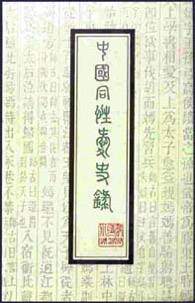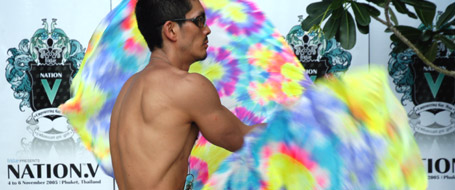So you had a good time in Phuket during the Nation V weekend. And for the next few weeks, there's an inner smile in you, a spring to your step, and new friends to chat with online. We tell each other, yeah it's good to be gay. We're proud of it. Each other, and no one else.
Then 20 years down the road, sitting in the doctor's waiting room, 15 minutes before your stem cell treatment for hair loss, you reminisce to the young punk next to you about the weekend, and he asks, "Did homosexuality begin with the Nation parties?"
"Of course not," you say.
"Prove it," he challenges you. That's why he's a young punk.
And you instantly dislike him, for something tells you, he has put you at a disadvantage.
You mention the ancient Greeks and Oscar Wilde, and somewhere in New York in 1969 there was Stonewall. You see, kiddo, all these were before Nation.
"Yes," he pushes back, "but all these were in the West."
He wants you to prove to him that homosexuality didn't come to Singapore - or Cambodia, Philippines, Korea, Indonesia, Thailand or whichever country you're in - from the West. He wants you to prove that the first documented case of homosexuality in his country occurred before the farangs (Thai for westerner or Caucasian), gweilos (Hong Kong/Cantonese term which literally means foreign devil), mat sallehs (Malay term to mean westerner or Caucasian) and angmohs (Hokkien term which literally means red hair) showed up at the Nation party.
And frankly, most of us would have a hard time doing so.
Inauthentic
Too often, we're a race without history. Too often, for history, we depend on others, such as the commercial media or professional academics, to document the times. But there is no law in heaven that they must document everything in equal proportion. What they choose to record is subject to commercial demand, editorial boundaries, and, let it be said, censors' edicts.
Murders are documented. Fashion trends are documented. Celebrities' couplings and decouplings are more than sufficiently documented. But gay and lesbian lives are all too often ignored.
What do we know, for example, of homosexually-inclined people of our own Asian country who lived two generations before us? What was it like to be homosexual in Shandong in the 1920s? In Malaya in the 1940s? In Vietnam in the 1960s?
They left little record of their lives. What thoughts filled their private moments? Where did they meet? What did they themselves think of their deepest longings? For answers, we generally have but blank pages. But we can excuse them, for in almost all countries of the region, those generations were imprisoned by forbidding social climates, often by conventional marriages, sometimes even by illiteracy.
The absence of history however, is not without consequence. We shouldn't be surprised that many people go around thinking that homosexuality never existed in our local cultures until imported from the West, and on that presumption accuse us of being misguided and see homosexuality as a threat to traditional culture.
The simple fact is, if we have no history, we have no authenticity, making the task of winning acceptance so much harder.
Samshasha (Xiaomingxiong), one of Hong Kong's leading gay activists, realised this when the proposal to repeal the law against buggery was floated in the early 1980s. There was thunderous opposition from the Hong Kong Chinese. Many of them took the view that homosexuality was alien to Chinese culture.
Samshasha fortunately, had been doing research for some time, so he put together what he had discovered and published a book in 1984, 'History of Homosexuality in China' (Zhongguo Tongxingai Shilu)
The thing about China is that its court history is unusually well documented compared to other civilisations. In addition, it had a rich literary tradition, so at least Samshasha had source material to work with, even if it wasn't representative of all social classes.
Other countries have less available.
Yet even Chinese history and literature has a serious gap that stretched through the first three-quarters of the 20th century, when due to influence from the West, the Chinese themselves considered homosexuality a taboo subject, and fell silent about it.
And it's been the same through the last few decades from one end of Asia to the other. This silence and the historical amnesia that results, is what makes us aliens in our own cultures.
Merely ether
Will it be different from now on? Aren't we all over the Internet now?

After all, in generations past, they cruised, they loved, they cried and they commiserated. Their lives were expressed in whispers, in chat, in letters and sometimes in bawdy jocularity.
Likewise, we of our generation chat, opine and joke, and given our technology, there's a torrent of it digitally. But it may prove just as ephemeral as in ages past.
What has lasted through time has generally been information that is organised and annotated. It can take many forms: factual records of events, biographies, fiction, poetry, painting, sculpture, collections of artifacts, maps... but all of them share the characteristic of somebody taking the trouble to organise them.
In our generation it can take additional forms of photography, cinema, and oral histories, but no less than before, we still need to organise and annotate the stuff to be of any use.
How often have we encountered in some shoebox somewhere an old photograph of a group of people smiling into the camera - we recognise two faces and know their names, we think we recognise two more but can't recall their names, but who the hell were the other three? Where was this taken? When was this taken? On what occasion?
Such a photograph is as good as useless historically. When we are dead, even the two recognised faces become unrecognised. Ditto with email, online forums, blogs and webpersonals. These too suffer death, for as soon as the host server goes offline, there is no guarantee that anyone will have archived it.
So for all our loquacity today, it may still mean that few in the next generation may know anything of us and our time. Our lives, our struggles and our joys may float by as unremembered as those before us, and once again a future generation is left without history, without authenticity.
What's gained can be lost
History is not linear. Rights and social space won today can be lost tomorrow. Democracies collapse into dictatorships, peaceful inclusive communities rend themselves asunder with new bigotries and dogmas. What we know today can be unknown tomorrow.
If we want the progress we have made to take root, we must document our times and our lives, so that future Samshashas have source material at hand to defend their rightful place in our nations, and future gay teenagers don't feel like aliens in their own communities.
How many of us have written about our self-discovery? Our coming out? Our families and friends? How many are writing about Phuket and Nation V? How many of us have organised our photographs in retrievable, meaningful ways?
These we need to do. But equally important, we need to start thinking about how all these can survive us to become part of our various cultures' collective memories and our countries' national histories. Then only do our lives survive us.
Alex Au has been a gay activist for over 10 years and is the co-founder of People Like Us. He is also the author of Yawningbread.org where he writes incisively about gay issues, and Singapore life and society.












 打印版本
打印版本













读者回应
抢先发表第一个回应吧!
请先登入再使用此功能。